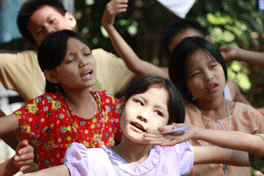I have been doing a report on Cyclone Nargis. If you are unaware Nargis was a cyclone that devastated the delta region of Myanmar in early May, killing tens upon thousands of unexpected victims. Currently, 55, 917 people are missing and 77,738 have been pronounced dead. Millions more are homeless without running water or a viable source of income.
Because the government stopped counting bodies, it is feared that the death toll could rise to one million.
If this is true than Nargis is the worst cyclone in recorded history.
Following the cyclone, Myanmar’s military led junta closed its borders to foreign aid. Behind the government’s blockades, even more needlessly died from disease and famine.
I have read some firsthand and have heard secondhand accounts. Here are three:
- One grandparent, while struggling to stay afloat, had to release one of her two grandchildren go in order to survive a giant a wave. Soon a second wave came and took the second child. She survived by holding to a tree.
- One survivor watched the 120 mph winds take away all his family members.
- One woman saved both herself and her child by grabbing a tree with both arms while biting her baby’s neck.
The cyclone severely affected the Karen, an intensely persecuted and marginalized people of this region. A huge portion of the victims who died was from this tribe, many of whom are believers.
Where is God in the midst of intense suffering? It is one of the deepest theological questions that many struggle with.
One relief worker told me that after the cyclone there has been a harvest of conversions- people who have found new hope in the gospel of Jesus Christ.
“I don’t understand why it happened like this,” he said. “We just have to say that God allowed it to happen. The believers are more close to God because they cannot depend on anything; even though some (relief workers) have donated, many can’t come. So they just trust God. “
With each visit, dozens and hundreds of people have turned their lives over to Jesus, he said. In various areas, church communities are beginning to spring up in the aftermath of this tragedy.
“On one side something bad happened, but on the other side there is the Lord’s harvest,” he said. “One side is very sad, on the other side God’s doing something.”
Nearly five months after the cyclone, the immediate trauma of the event has alleviated. The government has informally opened avenues for some international aid. However, Myanmar’s borders are still strictly regulated against outside agencies. Those who live in these regions have begun the slow process of piecing their lives back together- first by rebuilding their homes.
While the rehabilitation is underway, the long-term effects are evident. Many survivors, and even animals, cower and hide whenever strong weather begins to arise. These psychological effects linger and may remain for many years.
Hope for these victim’s futures are weighted in their perseverance to rebuild. But they are still in great need of assistance. With Myanmar’s rigid borders, the local people need to be empowered financially and spiritually so that restoration can move forward. Surrounding communities with access to the local people are the best avenues to give help.
One organization’s network of churches within the affected region is working towards empowerment through the local church. This network of churches and denominations has time-tested methods for crossing borders. God is bringing new life to a region flooded with death.
***
Personally, processing an event of such tremendous magnitude is draining. It would be easy to displace myself and think of something else. But that’s not why I’m here. Again, my mission is to act as a liaison between you and the people of the ARNA. Here are some of images that help articulate the grief experienced by the Burmese people. As a word of caution, some of these images are graphic.
You can contact me if you want to partner with a relief agency.
Nargis Photos
.gif)
.gif)

.gif)
.gif)
.gif)
.gif)
.gif)
.gif)
.gif)
A poem I wrote as I process this tragedy:
"CONVINCED"
In the wake of the wind,
There is forgiveness for sins
In the midst of weeping and wailing,
His mercies are never, never failing.
No. I am convinced.
Death’s stench cannot quench,
The river of God’s love,
He sees the tears,
And heals the wounds of the mourning.
On May 2, a million may have died,
But I am convinced.
His mercies are new, new every morning.
In the wake of the wind,
There is forgiveness for sins
In the midst of weeping and wailing,
His mercies are never, never failing.
No. I am convinced.
Death’s stench cannot quench,
The river of God’s love,
He sees the tears,
And heals the wounds of the mourning.
On May 2, a million may have died,
But I am convinced.
His mercies are new, new every morning.



